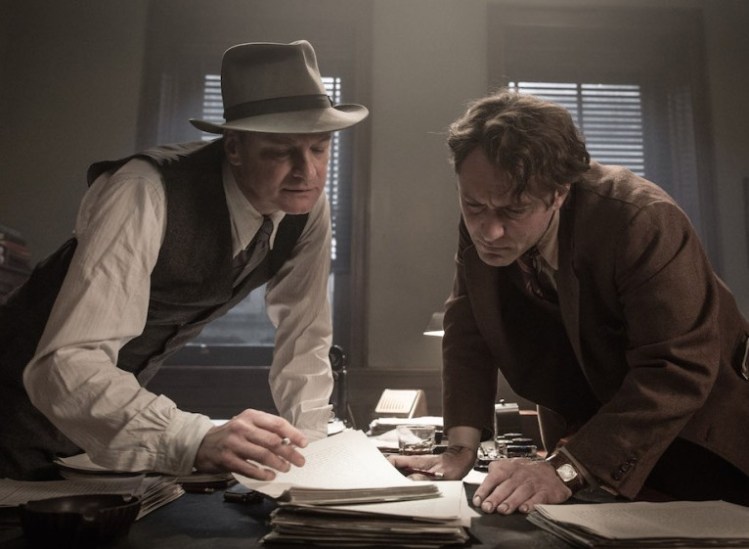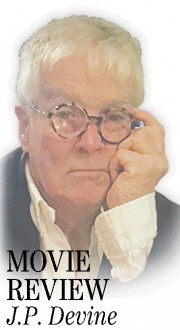“The only genius that’s worth anything is the genius for hard work.” — Kathleen Winsor
What we have here in this biopic of the relationship between the legendary Scribner editor Maxwell Perkins and the flamboyant, bloviating author Thomas Wolfe is something rarely touched upon: discovery.
More top line critics are complaining that a story about book editing is less than cinematic.
That’s true, but of course in this story, that misses the point. “Genius” is so much more.
The story of A. Scott Berg’s book and Michael Grandage’s film is that it’s a love story, not a cliche “bromance,” but about love of work, of one’s obsession that brought two men together who passionately, deeply love what they do and gave the world thousands of pages of art.
We see Wolfe bringing his massive jungle of prose — brilliant, spacious and overwhelming — to Perkins, who, with his magic knife of a red pencil, stripped away the flora and gave the world the garden that Wolfe was trying to present.
F. Scott Fitzgerald, after having read Wolfe’s “Look Homeward Angel,” wrote Wolfe and said, “You’re a putter inner, I’m a taker outer.” And every editor since the beginning of time lives by that rule. Wolfe couldn’t “kill his darlings” as another editor advised, but fought to keep every word. It was Perkins’ genius that convinced him to whack away.
The truth is, it never really worked. Wolfe’s “Of Time and The River” and “Look Homeward, Angel” were still doorstoppers that few English majors ever truly got through, but without Perkins, no fingers would have ever touched and turned the pages.
Perkins’ genius got through to Hemingway (a big fisted Dominic West) and Fitzgerald (a pale sketch of Scott by Aussie Guy Pearce) and dozens of others.
“Genius” does spend a touch more time than necessary on the details of creating a whole, but it’s the “genius” of Grandage’s casting that lifts the story to a shining place. Jude Law blows the roof off with his precise, over the top, all stops out imitation of Wolfe who, according to most of his peers, was a pompous alcoholic, party boor and insensitive clod. It seems that Jude nailed it.
The grown up in the relationship was Perkins, and the beautiful Colin Firth draws a sharp picture of the quiet man who loved his work more than his family, who never took off his fedora even at dinner. His Perkins is a man of quiet strength and infinite patience.
Nicole Kidman, slimmer than ever, with black hair and covetous green eyes, is here as Wolfe’s married mistress Aline Bernstein, a clinging, egocentric stage designer who is jealous of Perkins.
“He’ll leave you, you know,” she whispers. “You’ll lift him up and then he’ll leave you.”
The always stalwart, solo American in the cast, Laura Linney, has, as usual, little to do but to be stalwart as Perkin’s loving but suffering wife who tends to his flock of daughters while he tends to the ever suffering Wolfe.
I must note that actress Vanessa Kirby in one scene with no lines, simply sitting still at a dinner party as Wolfe torments her and the madness of Zelda Fitzgerald boils up in her eyes, has earned herself a great moment of film.
“Genius” is enhanced by the contributions of Ben Davis’ haunting and evocative cinematography. His rainy New York streets and Great Depression lines of beaten men are painful reminders of the time.
Mark Digby’s production designs and Jane Petrie’s costumes put the visual effect of the movie just on the edge of a “Godfather” level.
Remember, “Genius” is not about scribbling, editing and dusty publishing. It’s about love of work, of passion for one’s art, and the never fading magic of discovery.
J.P. Devine is a former stage and screen actor.
Copy the Story LinkSend questions/comments to the editors.




Success. Please wait for the page to reload. If the page does not reload within 5 seconds, please refresh the page.
Enter your email and password to access comments.
Hi, to comment on stories you must . This profile is in addition to your subscription and website login.
Already have a commenting profile? .
Invalid username/password.
Please check your email to confirm and complete your registration.
Only subscribers are eligible to post comments. Please subscribe or login first for digital access. Here’s why.
Use the form below to reset your password. When you've submitted your account email, we will send an email with a reset code.